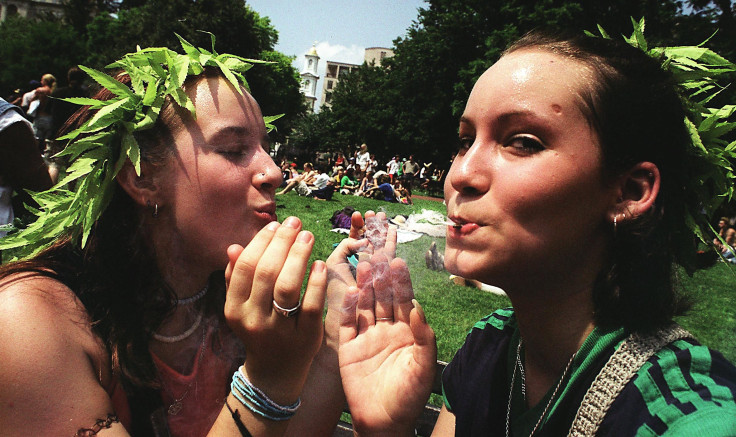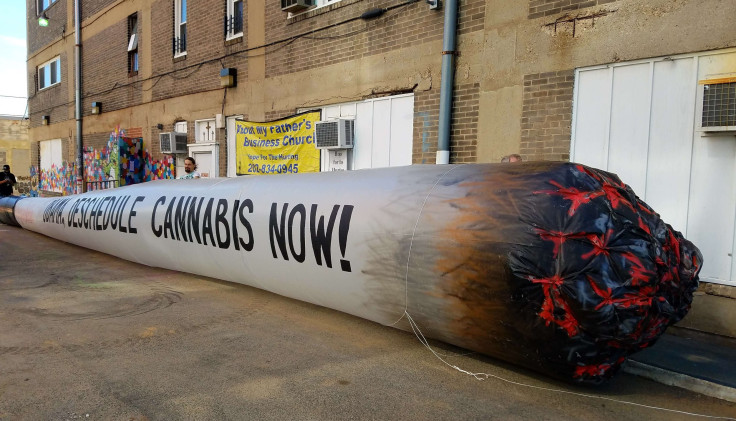Activists Plan Mass Marijuana Consumption At The White House, But Some Cannabis Advocates Question Civil Disobedience

The idea of marijuana smoke wafting across the White House lawn and snaking around the tall Ionic columns of the iconic Truman Balcony, perhaps even sneaking inside past the gilded furniture and portraits of presidents past, is a tantalizing prospect for organizers of a planned Pennsylvania Avenue demonstration.
Grassroots activitists at Saturday’s scheduled 2 p.m. marijuana legalization protest are armed with a 51-foot inflatable joint, a cage to lock up hypothetical cannabis “prisoners” and other attention-grabbing paraphernalia. Those gathered will rally for the millions of people arrested for marijuana during Barack Obama’s tenure and call for the president to deschedule cannabis so it’s no longer among the most prohibited substances in the country. According to organizers, the event will culminate at 4:20 p.m. with what they are saying will be the first major marijuana “smoke-in” in the nation’s capital. The egregious public consumption of marijuana will likely result in mass arrests — and that’s part of the plan.

But instead of garnering widespread support among like-minded brethren, many in the cannabis scene and growing industry are avoiding the demonstration, and some are questioning the logic of such tactics. The ambivalence highlights philosophical divisions within the marijuana movement: As the crusade to normalize cannabis finally achieves gains, what’s the best way forward to achieve its final goals?
Organizers conceived of the protest after the Obama signaled earlier this year he was not planning on major marijuana reform before the end of his administration. That, combined with the 5 million marijuana-related arrests that organizers say have transpired during Obama’s tenure, was enough to inspire action. “For someone who supposedly wants to stop incarceration, he has done nothing to stop this,” said Adam Eidinger, co-founder of DCMJ, the organization behind the successful 2015 effort to legalize marijuana in the nation’s capital and among the chief organizers of the smoke-in. “Here in D.C. [District of Columbia], we are an island of legalized marijuana surrounded by prohibition. People leaving the city are at risk of arrest. We want rights in all 50 states.”
Eidinger says he offered to call off the event, for which he didn’t seek a permit, if the president agreed to a “cannabis summit” with marijuana advocates. Since that hasn’t happened, organizers are moving forward with the demonstration, which according to Eidinger will include protestors representing multiple East Coast chapters of the National Organization for the Reform of Marijuana Laws (NORML) and organizations such as Weed for Warriors Project. Demonstrators will also be quietly advocating to make the District of Columbia the 51st state; that’s why the joint is 51 feet long.
But the protest hasn’t received support from the likes of the biggest marijuana groups like Marijuana Policy Project (MPP), Drug Policy Alliance (DPA) or NORML’s national wing. Nor will attendees likely include marijuana industry groups or many pro-marijuana politicians or celebrities such as Bill Maher, who smoked a joint on the air during his HBO show last month to argue for legalization.
“We ultimately don’t really participate in those types of events,” said Mason Tvert, MPP’s communications director. Tvert himself is no stranger to attention-grabbing protests. Prior to his current position, Tvert helmed the marijuana legalization organization Safer Alternative For Enjoyable Recreation (SAFER) based in Colorado, where his tactics included sponsoring controversial billboards; challenging John Hickenlooper, a former brewery owner turned Denver’s mayor and now Colorado’s governor, to a theoretical beer-versus-marijuana “drug-off”; and having a protestor run around in a chicken suit. But none of Tvert’s stunts ever involved him breaking the law, and he says his strategies, then and now, are focused on activities that have the potential to push the marijuana movement forward.
“If your goal is to make a statement, that is one thing,” Tvert said. “If your goal is to make change, that is potentially another.” (There’s also the concern that breaking the law could endanger MPP and other national marijuana organization’s federal nonprofit status.)
Some cannabis advocates don’t believe Saturday’s planned protest will change anything. As DPA’s national affairs director Bill Piper noted in a tweet Friday: “Mj smoke-in like open carry rally where people walk around w/ AR-15s. Participants feel good but voters turned off.”
Mj smoke-in like open carry rally where people walk around w/ AR-15s. Participants feel good but voters turned off.
— Bill Piper (@billjpiper) March 31, 2016
“We definitely feel there are a lot of ways to advocate for reform,” said Kaitlyn Boecker, DPA’s policy coordinator, in a phone interview. “We just don’t feel that public consumption on federal property is the right message.”
Boecker added Obama might not be the best target for those aiming to remove marijuana from the country’s list of controlled substances. “The process of administratively rescheduling marijuana is complex,” she said. “And President Obama cannot act unilaterally to deschedule cannabis. Even with the roadblocks we are facing in Congress right now, the legislative route is the best way to repeal the federal prohibition of marijuana.”
Some cannabis activists go further, fearing the smoke-in could hurt their cause. “The folks who are organizing this, Adam Eidinger and others, I have a lot of respect for them,” said Tom Angell, founder of the cannabis advocacy group Marijuana Majority. “But I feel what they are doing here is unhelpful and potentially dangerous to our continued success in D.C.”
Marijuana supporters are currently lobbying to allow recreational marijuana sales in the nation’s capital as well as permit private smoking clubs. Angell is concerned smoking pot at a major tourist attraction, especially during spring break for many of the country’s schoolkids, could derail that progress. “We need to help people see that legalization can be done responsibly in a way that doesn’t create harm,” he said. “Smoking marijuana in a public place where families from around the country and their children are vacationing doesn’t make this argument that legalization can be implemented responsibly.”
The increasingly powerful marijuana industry is also distancing itself from such acts of civil disobedience. “From a business perspective, this is exactly the opposite of what we have made strides to communicate to people in D.C.,” said Taylor West, deputy director the National Cannabis Industry Association. “Part of how we have been successful is to show this industry is made up of responsible small business owners who care about their communities, who care about ending prohibition, and who aren’t looking to act in an irresponsible way. That is how we get change. It’s not doing something like this.”
Plus, noted Angell, civil disobedience is a tactic best reserved as a last-ditch effort, when every other approach has failed. And these days, he said, the marijuana movement is scoring successes such as state legalization victories and shifting opinions in Congress without resorting to such extreme measures. “People are still being put into handcuffs and thrown into cages for no reason, but that is changing,” he said. “Civil disobedience is an important tactic, but not in this case.”

While Eidinger considers folks like Angell and DPA’s Piper his “brothers” in the movement, he’s frustrated by the lack of support for the smoke-in. While states like Colorado, Washington and Oregon now have thriving legal marijuana markets, he says the fact that millions of people, especially minorities, are still being locked up for cannabis offenses means elected officials aren’t doing enough to end the harmful effects of marijuana prohibition, and now is the time to hold their feet to the fire.
“I really question the validity of the viewpoint that protests are not justified at the White House right now,” he said. “Just when we should be putting pressure on the president, there is no pressure. It’s as if they want to keep prohibition longer.”
While Eidinger isn’t opposed to public marijuana consumption within limits, such as smoking, vaping and consuming edibles on the sidewalk, like organizers plan to do today, he says the point of the demonstration isn’t to rally for public pot use — it’s to push for reform in the most successful way possible. “They all say, ‘We are against smoke-ins.’ But that is one of our most powerful weapons,” said Eidinger, pointing to the hundreds of Keystone XL protestors arrested the White House in 2014, a year before Obama rejected the controversial oil pipeline project.
Eidinger, a longtime activist who has been arrested 17 times, including during several marijuana-related actions, said he’s not eager to be locked up again. “I have a kid, I don’t want to be in jail, but at this time in my life, I feel that this is such an important civil rights issue, I feel like we might need to be in jail to change these laws,” he said.
And while he’s disappointed in the divisions in the marijuana movement over such actions, he’s also savvy enough to know the additional attention the controversy is garnering for the protest could end up helping his cause. As he noted, “Maybe it will make for better copy.”
© Copyright IBTimes 2024. All rights reserved.





















